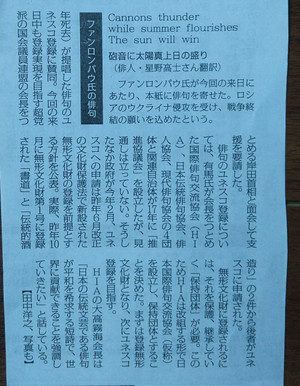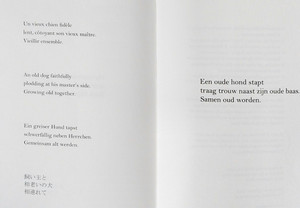Haiku of Bashō (183/300)《ほととぎす》
しばしまもまつやほととぎす千年
(shibashima-mo matsu-ya hototogisu sen-nen)
awaiting a cry of a little cuckoo,
for a short time_
as if for a thousand years
(注)
この俳句は「5-8-4」の破調です。
「松は千年竹は万年」という諺に因んで、「まつや」を「待つや」と「松や」の掛詞にしています。
しばしまもまつやほととぎす千年
(shibashima-mo matsu-ya hototogisu sen-nen)
awaiting a cry of a little cuckoo,
for a short time_
as if for a thousand years
(注)
この俳句は「5-8-4」の破調です。
「松は千年竹は万年」という諺に因んで、「まつや」を「待つや」と「松や」の掛詞にしています。
雲雀鳴く中の拍子や雉の声
(hibari-naku naka-no-hyōshi-ya kiji-no-koe)
cries of pheasants,
making rhythmical beats
among chirps of skylarks
降る音や耳も酸うなる梅の雨
(huru-oto-ya mimi-mo-suunaru ume-no-ame)
the sounds of rain,
falling on plum-trees,
make my ears sour.
うぐいすを魂にねむるか嬌柳
(uguisu-wo tama-ni-nemuru-ka taoyanagi)
graceful willow-trees
seem to sleep, dreaming of them
as bush warblers
物好や匂はぬ草にとまる蝶
(monozuki-ya niowanu-kusa-ni tomaru-chou)
whims!
butterflies staying on
scentless grasses
山吹や宇治の焙炉の匂ふ時
(yamabuki-ya uji-no-hoiro-no niou-toki)
Japanese rose blossoms_
the time for driers of tea-leaves
to scent at Uji
起きよ起きよ我友にせんぬる胡蝶
(okiyo-okiyo waga-tomo-ni-sen nuru-kochou)
wake up! wake up!
make friends with me_
sleeping butterfly
(注)
命令形ですが、俳句は散文ではないので文頭を大文字にせず、感嘆符を用いて句意を明瞭にしています。
青色文字の「俳句」や「HAIKU」をタップすると、それぞれ最新の「俳句(和文)」や「英語俳句」の記事のタイトルが表示され、この「俳句HAIKU」をタップすると最新の全ての記事のタイトルが表示されます。
タイトルをタップしてその記事をご覧頂ければ幸いです。
旅がらす古巣はむめに成りにけり
(tabigarasu furusu-wa mume-ni-narinikeri)
(試訳A)
a wandering crow_
its old nest has turned into
plum blossoms
(試訳B)
a wanderer_
his old hermitage has turned into
plum blossoms
(試訳C)
upon returning from a trip,
I found plum blossoms
around my old hermitage
(注)
試訳Aは原句を文字通りに英訳し、試訳Bは「旅烏」を人の意味に解釈して英訳し、試訳Cは句意の比喩を英語で理解できるように翻訳しました。
春の夜は桜に明けて仕廻けり
(haru-no-yo-wa sakura-ni-akete shimaikeri)
the spring night
has turned to dawn,
while viewing the cherry-blossoms
(注)
この俳句は「一句一章」の形式ですが、散文ではないので文頭を大文字にしていません。
観音のいらかみやりつ花の雲
kannon-no iraka-miyaritsu hana-no-kumo
the cloud-like cherry blossoms
seen around
the tiled roof of the kannon-temple
月ぞしるべこなたへ入せ旅の宿
(tsuki-zo-shirube konatae-irase tabinoyado)
the moon is your guide_
come here
for an inn on your journey
(注)昨年の試訳を見直しました。
 (写真)
(写真)
(ロンパイ夫妻の鎌倉訪問の「俳写」の一部。)
「Beigian」とあるのは「Belgian」のミスタイプで、酷い誤訳になります。
俳句の英訳を紹介するサイトが最近増えており、知人がメールしてくれたような翻訳というよりデザイン性を高めた「俳写」と称する写真英語俳句などもあるようです。
 ロシア侵攻によるウクライナ戦争に思いを馳せて元EU大統領ファン・ロンパイさんが詠んだ次の俳句と翻訳が、句友が知人からもらった新聞記事に、ありました。
ロシア侵攻によるウクライナ戦争に思いを馳せて元EU大統領ファン・ロンパイさんが詠んだ次の俳句と翻訳が、句友が知人からもらった新聞記事に、ありました。
新聞の写真をタップ拡大してご覧下さい。
Cannons thunder
砲音に太陽真上日の盛り
俳句は様々な解釈が出来ます。 夏最中 轟く大砲 勝つ太陽 これまでに書いた記事は次の通りです。
星野さんの翻訳は伝統俳句的名訳でしょうが、その翻訳からロンパイさんの句に込めた思いを理解するのは難しいのではないでしょうか?
翻訳する場合は作者の意図を汲んで原句の意味を忠実に訳出する方が望ましいと思っています。
ロンパイさんはイソップ寓話「北風と太陽」を念頭に、「太陽が勝つ」という表現をしたのではないでしょうか?
上記の翻訳にはそのような原句のニュアンスが無いので、原句の句意を尊重して、次のように試訳しました。
さまざまなタイプの誤訳がありますので、誤訳に関する記事を特集しました。
青色文字のタイトルをタップ(クリック)して、ご覧下さい。
子規の有名な俳句の誤訳を訂正して下さい。
松尾芭蕉や高浜虚子の俳句を英訳して、国際俳句協会のホームページに投稿している関係で、「英語俳句」をGoogle検索して、「英語で俳句!?詠んでみましょう!Haiku!」を読んでいると、正岡子規の俳句「柿食へば」の英訳に誤訳があるのに気付きました。
(写真をタップ拡大してご参照下さい。)
柿食へば鐘が鳴るなり法隆寺
この俳句の「柿くへば」の助詞「ば」は「仮定」ではなく、「したところ」という意味で、「柿を食った時に丁度」という意味です。
(「俳句を楽しもう! フラワータウンカレッジ講演の要旨」参照。)
英語が巧でも日本語をよく理解しなければ俳句の英訳は出来ませんよ!
どうぞ、「英語で俳句!?」の記事を速やかに見直して、
先日、「俳句HAIKU」の記事「言葉の力・俳句の力《癒し》」を書きましたが、国際俳句協会HPの「英語でわかる芭蕉の俳句」や「高浜虚子の俳句をバイリンガルで楽しもう!」を読んで頂き、「俳句の奥深さ・面白さ」や「翻訳の難しさ」をご理解頂けると幸いです。
国際紛争の原因の一つは「言葉の壁」です。
ロシアがウクライナ侵攻を止め、「血に染むなドニエプルてふ春の川」で述べた如く、ウクライナに春が来ることを祈っています。
政治家も言葉を大切にして欲しいものですが、世界の人々が「言葉の壁と力」を理解して、俳句を通じて世界平和を実現する地道な努力をしてくれることを切望しています。
この思いをSNSでシェアーして頂けると望外の喜びです。
青色文字をタップすると、最新の「俳句(和文)」や「英語俳句」の記事をご覧頂けます。
2022年7月11日に、鎌倉八幡宮の「直会殿(なおらいでん)」で開催されたヘルマン・ファン・ロンパイ氏(EU理事会初代議長)と高野ムツオ氏(日本現代詩歌文学館館長•「小熊座」主宰)の講演(俳句ユネスコ登録推進協議会と国際俳句協会の共催)を拝聴しました。
この講演会は、「言葉の力」がテーマでしたが、両氏のお話から「俳句は癒しになる」という印象を受けました。
 ロンパイ氏は次の自句を引用し、「自然を観察して俳句を詠むことによって、人は謙虚になる」と言われました。
ロンパイ氏は次の自句を引用し、「自然を観察して俳句を詠むことによって、人は謙虚になる」と言われました。
ロンパイさんのお考えに共感し、俳句を世界に普及する一助となればとの思いで、2017年頃から草の根運動の記事を「俳句HAIKU」に書いています。
An old dog faithfully
plodding at his master’s side,
Growing old together.
(Rompuy)
忠犬や主人に沿ひて相老ひて
(訳:薫風士)
犬や猫などペットを飼っている人は沢山いますから、ロンパイさんはそのことを意識してこの俳句を詠まれたのでしょう。
この俳句には、季語がありませんが、ひょっとして愛犬「チュヌ」をスポークス・ドッグにした「チュヌの便り」のことも小耳に挟まれたかもしれないなどと、我田引水の解釈をしています。(お笑)
「ポーランドの旅(写真と俳句・講演のことなど)」をご覧下さい。
ロンパイ氏が東京新聞に投稿された俳句の試訳をしました。
A sunny wheat field
Strewn with senseless death
Hungry for peace
陽に煌めく麦畑
遠近(おちこち)に意味なき死
平和に飢ゑつ
上記の和訳は、5・7・5の定型に捉われず原句のニュアンスを訳出した薫風士の試訳です。
原句は「5・5・4」音節ですから、「俳句」と言えるでしょうが、この試訳は「10・10・7」のリズムですから「俳句」というより「三行詩」というべき翻訳です。
俳句は省略の文芸ですから、悪く言えば片言であり、その解釈は読者次第です。
英語などの俳句を翻訳する場合は、日本語としての俳句の形式より、作者が原句に込めた思い・句意を訳出することが大切だと思います。
高野氏は東日本大震災に遭い、自宅へ徒歩で帰る途次にも自然に俳句が浮かび力づけられたと、「俳人の『俳』は人に非ずと書く」と冗談気味に言われたのが印象的でしたが、この言葉と津波を詠んだ次の俳句と関連付けて深読みすると、この俳句の面白さ・深さがわかるでしょう。
車にも仰臥(ぎょうが)という死春の月
(高野ムツオ)
ここをクリック(タップ)すると、HIA 国際俳句協会HPの記事「ファンロンパイ旋風」で、ファン・ロンパイ夫妻の来日・俳句交流の状況などの写真をご覧になれます。
大人びた言葉口真似夏休み
(薫風士)
ここをタップして、ウクライナへの応援句「ヨイクの日和平祈るや朧月」をご覧下さい。
ここをクリック(タップ)して、「『花祭』の俳句《21世紀の宗教・世界平和を考える》」をご覧下さい。
青色文字をタップすると、最新の「俳句(和文)」や「英語俳句」の記事をご覧頂けます。
芭蕉の俳句300句の翻訳の切っ掛けになった著書「575 THE HAIKU OF BASHO」(White & Sato)には「雛」の俳句が掲載されていません。
「奥の細道」の冒頭部分にある重要な俳句ですが、句意の解釈に諸説があり、White & Sato の両氏は翻訳に躊躇したのでしょうか? その理由はともかくとして、重要な俳句を無視できませんので、通説に従い「Haiku of Bashō・芭蕉の俳句」の番外編として書きました。
(kusa-no-to-mo sumi-kawaru-yo-zo hina-no-ie)
the house with a grass-door,
now a dwelling for
a family with hina-dolls
芭蕉は次の俳句も詠んでいます。
(kusa-no-to-mo sumi-kawaru-yo-ya hina-no-ie)
(「世」を「所帯・家族」と解釈した翻訳)
the house with a grass-door,
from family to family_
a dwelling with hina-dolls
または、
(「世」を「世代」と解釈した翻訳)
the house with a grass-door,
generation to generation_
a dwelling with hina-dolls
(注)
青色文字の「俳句」や「HAIKU」をタップすると、それぞれ最新の「俳句(和文)」や「英語俳句」の記事をご覧頂けます。
(musubu-yori haya-ha-ni-hibiku izumi-kana)
before scooping the water,
sooner affecting my teeth_
such a fountain!
ここをクリック(タップ)すると、「575筆まか勢」・「泉」の例句をご覧になれます。
「泉」や「噴水」は「夏の季語」です。「夏の俳句特集」をご覧下さい。
トップの欄・「俳句HAIKU」、または、ここをタップ(クリック)すると、最新の全ての記事が掲示されます。記事のタイトルをタップしてご覧下さい。
(tsuru-no-ke-no kuroki-koromo-ya hana-no-kumo)
black feathers of a crane,
so looks your robe_
clouds of cherry blossoms
(注)
この俳句は蝉吟(芭蕉の門人)が伊勢に旅立つ時の銭別吟です。
「鶴」は「冬の季語」で、「花の雲」は「春の季語」ですが、この俳句の主たる季語は「花の雲」ですから、「季重なり」の問題はありません。
「so looks your robe」は「倒置法」による表現です。
興味があれば、
をご覧下さい。
カラー図説 日本大歳時記 「花」や「桜」の例句や解説の一部をご覧になれます。
トップの欄・「俳句HAIKU」、または、ここをタップ(クリック)すると、最新の全ての記事が掲示されます。記事のタイトルをタップしてご覧下さい。
(otoroi-ya ha-ni-kuiateshi nori-no-suna)
(161/300)
waning teeth_
noticed upon biting
a grain of sand in the laver
(ubazakura saku-ya-rō-go-no omoi-ide)
(162/300)
ubazakura in bloom_
causing me to think of
life in old age
(yo-o-tabi-ni shirokaku-oda-no iki-modori)
(163/300)
life on journey_
like plowing for rice-planting
back and forth in small paddy fields
(haru-ya-kishi toshi-ya-ikiken kotsugomori)
the spring has come_
has the year gone?
Kotsugomori
(注)
例年なら、「立春」は「大晦日」(陰暦12月30日)ですが、芭蕉は、「立春」が「小晦日」(陰暦12月29日)に当たり、例年ならまだ立春でないことを面白く俳句で表現したのでしょう。
この解釈が誤りであれば、問題点を指摘して、この俳句の正しい解釈を教えて頂けると幸甚です。
(nannoki-no hana-towa-shirazu nioi-kana)
(165/300)
what tree in bloom?
unknown to me,
so strong a scent
(kutabire-te yado-karu-koro-ya fuji-no-hana)
(167/300)
exhausted,
time to seek an inn_
wisterias in bloom
(kani-nioe uni-horu-oka-no ume-no-hana)
(167/300)
Smell fragrant!
plum trees
on the peat-digging hill
(chō-tori-no uwatsuki-tatsu-ya hana-no-kumo)
(168/300)
butterflies and birds,
buoyant_
clouds of cherry blossoms
(uguisu-ya mochi-ni-funsuru en-no-saki)
(169/300)
a bush warbler,
droppings fallen on rice-cakes
at the edge of wooden veranda
(umi-wa-hare-te hiei-furi-nokosu gogatsu-kana)
(170/300)
the sky cleared up over the lake,
still raining at the Mount Hiei_
such a May
(注)
「such a May」は、芭蕉が「五月かな」と「琵琶湖の5月の気象の特異性」を詠嘆したと解釈して、敢えて不定冠詞「a」をつけて、強調表現にしました。
青色文字をタップすると、最新の「俳句(和文)」や「英語俳句」の記事をご覧頂けます。
トップ欄か、この「俳句HAIKU」をタップすると、最新の全ての記事(タイトル)が表示されます。
記事のタイトルをタップ(クリック)して、ご覧下さい。
(tsuki-yuki-to nosabari-kerashi toshi-no-kure)
(151/300)
moon and snow,
fleeting_
the end of year
(kuratsubo-ni kobōzu-noru-ya daiko-hiki)
(152/300)
a child playing
on a saddle-seat_
the parents pulling out radishes
(kogarashi-ni iwa-fuki-togaru sugima-kana)
(153/300)
wintry blasts_
rocks look sharpened
among cedar trees
(ro-no-koe-nami-o-utte harawata-kōru yo-ya-namida)
(154/300)
sounds of the oars slapping waves,
the cold night freezing my bowels_
tears
(注)
芭蕉の「涙」の実態は、「悲壮」か「悲哀」か、いずれにせよ余計な修飾はせず、「tears」と3行目を1語にして、字余りの破調の原句の韻を活かす意訳をしました。
(mizu-samuku neiri-kanetaru kamome-kana)
(155/300)
the water cold_
hardly sleeping,
the seagulls
(abura-kōri tomosibi-hosoki nezame-kana)
(156/300)
awoken
at a slim lamp-light,
the oil freezing
(注)
「芭蕉俳句全集」によると、この俳句は芭蕉の作か疑問視されています。
(kiku-no-nochi daikon-no-hoka sarani-nashi)
(157/300)
after chrysanthemums,
nothing left to cherish
but radishes
(fuyu-no-hi-ya bajō-ni-kōru kagebōshi)
(158/300)
a wintry day_
frozen on the horse back,
my shadow
(tabi-ni-yande yume-wa-kareno-o kake-meguru)
(159/300)
ill in bed on a journey,
my dreams wander around
withered fields
(注)ご参考までに他の翻訳を掲載します。
「枯野<芭蕉の辞世句> ドナルド・キーン訳の推敲を考える」をご覧下さい。
ill on a journey,
my dreams are wandering round
on a withered moor
(Donald Keen 訳)
Stricken on a journey,
My dreams go wandering round
Withered fields.
(shirauo-ya Kuroki-me-o-aku nori-no-ami)
(160/300)
the whitebaits_
opening their black eyes
in the priest’s net
(hi-ni-kakaru kumo-ya shibashi-no wataridori)
(141/300)
the sunshine blocked by clouds_
a brief passage of
migratory birds
(umi-kure-te kamo-no-koe honoka-ni-shiroshi)
(142/300)
(翻訳A)
the sea has darkened,
cries of wild ducks_
dimly white
(翻訳B)
the sea has darkened_
cries of wild ducks,
sounding dimly white
(翻訳C)
the sea has darkened_
cries of wild ducks
around dimly white view
(注)
「白し」の主体が何か、様々な解釈があります。
(A)は原句の破調による叙情性を活かすために敢えて主語を補足せず、原句の「味わい・曖昧さ」を残しました。
(B)は「鴨の声をほの白く感じた」と解釈して翻訳しています。
(C)は「鴨の鳴き声の辺りがほの白く見えた」と解釈して翻訳しています。
(ishiyama-no ishi-yori-shiroshi aki-no-kaze)
(143/300)
at Ishiyama Temple,
whiter than the white rocks_
the autumn winds
(注)
原句の韻(ishi・shiroshi)と形は異なるが、英語俳句として「white」に韻を持たせて意訳し、句意を明瞭にしました。
(matsu-sugi-o homete-ya-kaze-no kaoru-oto)
(144/300)
praising pine and cedar trees,
fragrant sounds of
winds
(niwatori-no koe-ni-shigururu ushiya-kana)
(145/300)
cries of cocks_
cattle shed
under early winter rain
(shiratsuyu-mo kobosanu-hagi-no uneri-kana)
(146/300)
white dews,
none of them dropped,
undulating bush clovers
(hatsuyuki-ya suisen-no-ha-no tawamu-made)
(147/300)
the first snowfall in the season,
weighing down
the narcissus leaves
(hatsu-shigure saru-mo-komino-o hoshige-nari)
(148/300)
the first winter rain_
monkeys look longing for
tiny straw cloaks
(kasa-mo-naki ware-o-shigururu-ka nanto-nanto)
(149/300)
wintry showers
against me without straw hat_
oh! dear,dear!
(fuyugomori mata-yorisowan kono-hashira)
(150/300)
winter seclusion_
I’ll lie close to
this pillar
青色文字をタップすると、最新の「俳句(和文)」や「英語俳句」の記事をご覧頂けます。
トップ欄か、この「俳句HAIKU」をタップすると、最新の全ての記事が掲示されます。